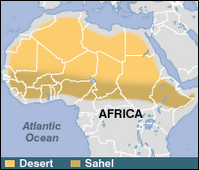"the path to ruin"
this past wednesday students had the distinct priviledge of attending a conversation between jonathan ledgard, a foreign correspondent with the economist since 1996, and jeffrey sachs, one of the most important economists of our time. he was economic advisor to bill clinton, and is currently professor of health policy and management here at columbia, and fills many other capacities as well. he is a special advisor to the secretary of the un, and director of the un millenium project. in 2005 his book the end of poverty was published (perhaps some time i will get around to reading it).
the purpose of this live seminar/conversation/debate was to explore the factors involved in creating the abject conditions in the region of the sahel (see map), especially somalia and the sudan; specifically, they examined the causes for the deep instability leading to wars and, worse yet, genocides, as seen in darfur.

sachs is known for his holistic, enviromental approach of dealing with the crises in the sahel. he believes that three environmental factors lead to societal backlash and political unrest: 1) inability to grow food, 2) disease, 3) physical isolation (from resources). i think these three are very much connected since disease often stems from lack of proper nutrients and medical attention.
he also showed an interesting graph which charted the precipitation in the sahel region over the past 90 years or so. from about 1910 to 1960, rain was abundant during rainy season. however, since about 1970, there hasn't been one significant rainy season. researchers used to believe that the region was so arid due to the constant mining of the environment (cutting down trees, plants, removing water/nutrients from the ecological system), but now contend that these dramatic changes seen over the past century are the result of global climate changes, including changing sea surface temperatures.
these environmental factors are easy ignore when thousands are dying in wars, and governments remain shackled and powerless. in fact, currently somalia is without a standing government. by tackling the underlying environmental and health issues, sachs argues, societal unrest and political upheaval will decrease.
to exacerbate circumstances, enter the taliban. the taliban movement is actively involved in recruiting members to its legions, and to the thousands suffering in extreme poverty, any tangible group promising hope may be welcomed. indeed, the taliban controls many courts in central and western somalia, and there are fears that by inciting violence against the other political parties of somalia, and against neighbouring ethiopia, another war is looming. to make matters more interesting, ethiopia is a predominantly christian nation, and has the backing of the united states.
according to ledgard, there have been 41 genocides/politicides since 1955. truly an astounding number. efforts have been made to predict when and where a genocide may occur; in fact, there are 7 risk factors or indicators that are actually quite accurate in predicting the occurence of a genocide. somehow, despite these early warning systems within the cia, financial commitment to the program is lacking. investments by the usa to an instable region are almost always military, despite any warning indicators: $550 billion in military development/activity versus $4 billion in societal developmental programs (food, medication, water, housing, tools, etc). sachs believes that by funding such societal developmental programs, the root causes of the political unrest and the wars will be eliminated. sachs is imploring governments to shift their financial targets from the military to the people and the land of the impoverished nations.
ledgard has written an article (titled the path to ruin) in the august 10th issue of the economist aptly describing the dire state of affairs in the horn of africa.
lastly, ledgard commented on the state of journalism. despite the increased need to aid the people of africa, media coverage of the region has actually decreased in the past decade. even the bbc has scaled back its deployment of reporters to the area. he finds this depressing, and yet challenging, urging journalism students to continue to fight to bring the important truths to the rest of the world. the internet has increased the pace of the 24/7 news cycle, and as a collective society, we rarely have time to engage in substantial discussion about each important topic.
sachs of course has his critics. there are many who believe that throwing more money at the problem has been tried before, and has failed. one man, professor william easterly at new york university, is an especially strong critic (it has been reported that the two men are not on speaking terms). i agree with easterly in some ways: much of any financial aid provided to these nations is largely swallowed by corrupt officials, thus necessitating a grassroots effort aimed at helping one family and one village at a time. this perspective eschews the holistic approach advocated by sachs. more about this can be found online.
unfortunately, i wasn't afforded the opportunity to ask sachs a couple of questions, he was ushered out quickly; but he is speaking again soon, so maybe next time. overall, the event was very informative and engaging. although the subject itself was despairing, it was in a way inspiring to see people think and question and act in a way to bring about some form of change. although, even to the most strong willed of men, the ending of poverty may seem a Sisyphean task.
0 Comments:
Post a Comment
<< Home